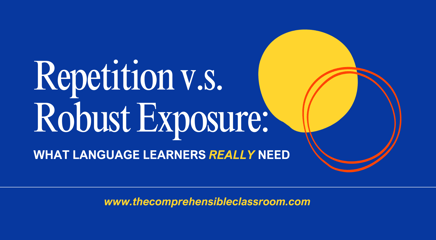This is a listening assessment that I used after we spent some time using present progressive verbs, and I think that it works best when you have a targeted verb tense that you are comparing to something else. In this case, present vs. present progressive. First, write up five to six mini-scenes (only one or two sentences each) that include a subject, an action, a location, and extra information. For example, "My good friend Jim loves to eat fresh fish. He is fishing in Homer this weekend!" "Is your grandpa angry? He is standing on the front porch and he looks upset!" "There is a very fat dog that lives next door. Right now, he is eating the garbage in front of my house!" Then, pull out the subjects, the actions (in this case, the ongoing actions expressed in the present progressive), and the locations and put them out-of order in three columns: a fat dog is eating front porch my friend is standing in front of my house your grandpa is fishing in Homer As you read each scene twice (maybe three times if it's a low level class), students choose the correct subject, action, and location from their respective columns and write them down on their papers. I like giving the students their options versus asking them to pull out the material and translate it on their own, but that would be a higher-level assessment that would be appropriate to use for old material and/or at higher levels. The assessment that I used for present progressive is contained in my present progressive notes, available on TpT.
More from the blog
View Blog-

Why We Don’t Use IPAs (And Why You Might Not Want To Either)
Oct 14, 2025Integrated Performance Assessments (IPAs) have gained traction in many districts as a way to assess language performance. They sound appealing in theory: assess all three modes of communication through a real-world task, wrap it in authentic context, and align it to ACTFL proficiency levels. In theory, it’s a complete package.
But at The Comprehensible Classroom, we don’t use IPAs. Not in our Vamos Curriculum, not in Somos, and not in any of our programs.
-

Assessing Student Speaking Without Stress: Tips for Input-Rich Classrooms
Sep 30, 2025If language teachers are serious about building proficiency, they need assessments that reflect real communication: not memorized scripts or forced output. Here are 3 pieces of advice Elicia Cárdenas, Director of Professional Learning for The Comprehensible Classroom, would give to her younger self on the topic.
-

Repetition v.s. Robust Exposure
Sep 21, 2025Discover why repetition alone doesn’t lead to fluency and how robust exposure creates the right conditions for real language acquisition.
